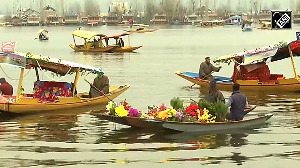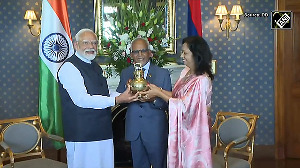Former IIT-ian Satish Kini is so inspired by President A P J Abdul Kalam's Wings of Fire that he buys hundreds of copies of them and distributes them among the young. Sluggishness of old age has no place in his dictionary -- nothing can be or should be allowed to stay static. He is for constant movement and dynamism. Nothing motivates him more than the fervour of the youth.
Having started his career in the corporate sector, Kini is now into healthcare management sector and promises to make the segment stand on its head in no time. As head of 21st Century Healthcare Solutions, Kini is out to transform healthcare with people, processes and technologies.
Looking forward to the Pan-IIT Global Conference 2006 to be held in Mumbai in the third week of December, he spoke to Senior Associate Editor (features) Indrani Roy Mitra about the IIT-ians' roles in shaping the future of India.
Excerpts:
What is it about the IITs that sets its graduates apart from others?
I don't want to make it look like that the IIT-ians are a different breed. You can broadly split them into two halves -- how they are when they get into the IITs and how they are when they finish their course.
- Participate in the PanIIT 2006 Global Conference! Click here to register now
Before they enter IITs, they are good at academics, toppers in schools and colleges. After they get in, the very environment of IIT inculcates a spirit of achievement in them and they take pride in the fact that they are into one of the premier educational institutes of the county.
The IIT environment gives the IIT-ians a different profile.
IIT education does not necessarily make us technology wizards. But IIT-ians are the people who are willing to take on challenges. They are always are ready to experiment, they don't want to be stuck into a routine.
Which is why in the early 70s, many IIT-ians moved abroad as India could not provide them with enough challenges. Things are different now.
When you made it to the IIT what was that experience like?
In our days, IITs were not as hyped up as they are today. However, getting admission into IITs was considered a hugely prestigious affair and a vey difficult task. We did not need to slog for two years to prepare for the entrance examination. The feeling to get into an IIT used to be great though.
We had an interesting mix of people -- there used to be no discrimination among our classmates in terms of caste, creed, religion, financial status and so on and so forth.
There was an underlying sense of responsibility in each one of us -- no matter whatever stream we choose, we must give something back to our country.
How did IIT education prepare you for your career?
I am into healthcare management now and at present am busy transforming the Goa Medical College. But I started my career in the design section of Godrej. Though I wasn't particularly happy about the job I did in the three years I spent there, I learnt a lot about people.
For instance, I came to know about the corporate culture, white lies. I cannot forget how an old worker once taught me that God has not given us any bone in our tongue so that we can use it to our convenience for or against our colleagues.
After a while, however, I got bored with the inertness of the senior people of the company and was drawn to the information technology sector soon after, the lessons of life that I learnt from Godrej stayed with me throughout. The next company that I joined was IDM.
'Inspire, Involve and Transform India.' Can you dwell upon the significance of the theme for this year's Pan-IIT global conference?
I would add another 'I' to the coined acronym -- innovate. I feel unless you innovate, you cannot inspire, get yourself involved in a project and can actually bring about a transformation. By innovation, I do not mean technical innovation only. By innovation I mean the way you deliver services. Take the case of banking as an example. Who could think of ATMs 10 years back?
The Pan IIT conference will go a long way in bringing out more transformation in the country. I complement Ashank (Desai), the IIT conference chairman, who took a year's sabbatical to organise things.
This conference should decide how we get together in smaller groups later and carry forward the agenda that are decided at the conference. I do hope that's what comes out of the event. I do feel information technology, people and process together can transform the entire world.
How can IIT-ians help address the challenges India faces in the new millennium?
IIT-ians are especially skilled to do two particular things -- seeking problems and digging out their solution.
IIT-ians' task is to use the knowledge they have acquired into seeking the unknown. Theirs is to face the hitherto unforeseen challenges and invent ways to counter them.
Should India have more IITs?
Of course -- it's always a welcome idea. But while building such institutes, the government should not go by quantity but by quality. There is no point in having average IITs, which score only in number.
Participate in the PanIIT 2006 Global Conference! Click here to register now






 © 2025
© 2025